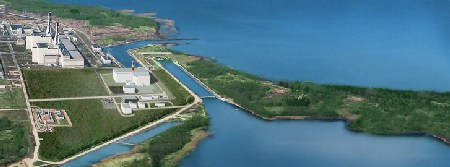The contractual framework for the construction of Europe's first advanced boiling water reactor has been laid down in an agreement signed by the Lithuanian government and strategic investor Hitachi.
 |
| Visaginas will be built next to the closed down Ignalina units |
The Concession Agreement for the Visaginas power plant was signed by Lithuanian energy vice minister Žygimantas Vaičiūnas, who is also head of the country's concession tender commission, and Hitachi vice president Masaharu Hanyu. It will now be reviewed and discussed by the Lithuanian government before being submitted to parliament for a formal vote. Final approval is expected to be reached during the current parliamentary session.
Once parliamentary approval is received, the concession for power plant construction will be granted to a new project company to be set up by Hitachi, Visaginas project company VAE and other regional partners. The new project company will then conduct engineering, procurement and construction negotiations with the aim of concluding contracts "by around summer of 2012", according to Hitachi.
The agreement sets out the contractual framework for the project. It provides rights for the project company to design, construct, operate and eventually decommission the plant and host country and investor rights and obligations, as well as formalising and concluding the procurement for Hitachi investment and Hitachi-GE technology. It also includes an agreed timeline for delivery, and will enable further design, licensing and site preparation activities in the pre-construction phase to go ahead, including commercial investment by the strategic investor (Hitachi-GE) and the other investors.
Lithuanian prime minister Andrius Kubilius described the agreement as a significant milestone for an important regional project. "The Visaginas Nuclear Power Plant presents Lithuania and the Baltic region with a once in a lifetime opportunity to diversify energy sources and enhance energy security and independence as well as continue our integration into Europe. The agreement with Hitachi is also a vote of confidence for what will be the largest foreign direct investment in the history of Lithuania," he said.
Visaginas is to be built on a site adjacent to two Soviet-era RBMK nuclear reactors at Ignalina which were forced to close as a condition of Lithuania's accession to the European Union, leaving the region heavily dependent on imported electricity. The prime ministers of Estonia, Latvia and Lithuania recently reaffirmed their commitment to the joint project to build a new nuclear power plant serving the Baltic states, promising to work together to make sure progress is maintained. Poland withdrew from the project in 2011.
Researched and written
by World Nuclear News






_13505.jpg)
_87975.jpg)
_67826.jpg)






